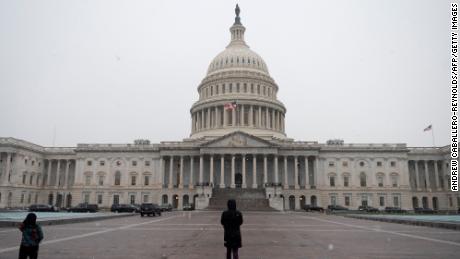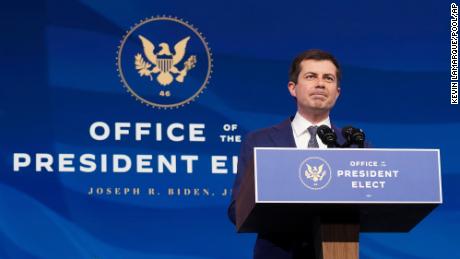Deal reached on coronavirus relief package
New York (CNN Business)Just before the buzzer sounds on 2020, Washington has finally agreed on a $900 billion relief package that avoids driving the US economy off a cliff.
But Uncle Sam’s work rescuing the economy from the worst pandemic in a century is not nearly done. Unemployed Americans, hurting small businesses and state-and-local governments are going to require more help in 2021.
Voters in Georgia’s two Senate runoffs on January 5 will have enormous sway over how much more aid comes from Washington. And that in turn will help shape the strength and sturdiness of the post pandemic recovery
“The races in Georgia are incredibly important,” said Kristina Hooper, chief global market strategist at Invesco. “If we see one or both seats going Republican, it’s going to be harder to get significant stimulus packages from Congress.”

That’s because with Joe Biden in the White House and federal budget deficit skyrocketing, Republicans are unlikely to back another round of major aid. Even with President Donald Trump at the helm and growth slowing, some members of the GOP were opposed to a sizable stimulus package before the election.
“We’re on the precipice of Republicans returning to fiscal austerity now that there’s a Democrat in the White House,” said Ed Mills, Washington policy analyst at Raymond James. “I find that members of Congress care about the debt and deficit when they’re in the minority.”
The pandemic has no doubt exacerbated America’s debt problem. The federal government and economists alike have been forced to set aside concerns about the deficit to keep the economy afloat.
‘Clearly not enough’
The new $900 billion Covid relief package should help stabilize the economy and lower the risk of a double-dip recession.
The deal provides stimulus checks to households and potentially forgivable loans to small businesses. Crucially, the compromise prevents unemployment and other benefits from lapsing on millions of Americans and provides billions to help distribute vaccines that should allow the economy to reopen.
“The chance off a first-quarter recession have dropped significantly in the wake of congressional agreement on a $900 billion aid package. That’s a very big deal,” Greg Valliere, chief US policy strategist at AGF Investments, wrote in a note Monday.

But Congress didn’t avoid the looming benefits cliff — it just built a longer road to it. For instance, $300 weekly unemployment benefit enhancements are only being provided for 11 weeks, punting the issue until mid-March. Likewise, pandemic unemployment programs for gig workers and the long-term unemployed would phase out in early April.
“It’s unlikely that the economy will be up and running by then, so more aid will be required,” Valliere wrote.
The package also lacks aid for state and local governments, raising the specter of layoffs as cities and states struggle to balance their budgets. And the eviction moratorium is only being extended until the end of January.
“The short-term nature of this relief underscores the need for a further relief package in the new Congress,” David Kelly, chief global strategist at JPMorgan Funds, wrote in a note to clients Monday. “It is clearly not enough to sustain either the unemployed or small businesses until the pandemic winds down.”
Virus fears return
Hooper echoed that sentiment, saying the economy will “absolutely” need more help.
“As long as the economy is in crisis and the pandemic continues, there will be a need for additional stimulus,” she said.
That point was underscored by rising fears about a new coronavirus variant in the United Kingdom that prompted a number of countries to cut off travel with the United Kingdom. Stocks and oil prices retreated Monday on concerns about what the developments mean for the recovery.

Before the election, leaders in Congress and the Trump administration were negotiating a far larger stimulus package totaling $1.8 trillion. But that agreement fizzled out.
“Certainly, something is better than nothing,” Hooper said. “But this is not a very robust stimulus package compared to other iterations of it and previous tranches.”
That’s why what happens next in Georgia is such a big deal.
If Democrats sweep both races, they will effectively control the Senate, with Vice President-elect Kamala Harris breaking the 50/50 tie. That’s hardly a blue wave, but it would be enough to narrowly pass some major legislation — including future stimulus.
“It’s simple — if the Republicans win just one of the two seats, they will retain control of the Senate, which would point to a small bill,” Valliere wrote. “If the Democrats win both seats — and thus the Senate — a much larger stimulus bill would be likely.”
Both races in Georgia are within a point or two, meaning they are “way too close to call,” according to CNN’s Harry Enten.
If Democrats sweep in Georgia, they could have enough votes to roll back the Trump tax cuts on corporations and the wealthy. But any tax hikes would be viewed as a negative by investors because the 2017 tax cuts helped boost corporate profits and stock prices.
Infrastructure hinges on Georgia
The fate of a long-elusive infrastructure package may well be decided by Georgia voters as well. Biden has called for a staggering $3 trillion of infrastructure spending to repair roads, bridges and airports — and give the recovery a boost.
Economists have long said that an infrastructure package makes a lot of sense, especially given historically low borrowing costs. The federal government can borrow for 30 years at just 1.7%. That’s less than half the interest rate of two decades ago.
“Infrastructure is a long-term investment. It’s not just to stimulate the economy. We actually have infrastructure that is crumbling,” said Invesco’s Hooper. “It’s very much-needed and should be part of a rebuild of our economy.”

If Democrats win both Georgia runoffs, Biden’s $3 trillion Build Back Better Plan “is in play,” Chris Krueger, policy analyst at Cowen Washington Research Group, wrote in a note to clients. “If not, $1 trillion is probably the ceiling.”
And that $2 trillion gap could have a profound impact on how strong — and how inclusive — the recovery from the pandemic is.
“The order of magnitude on fiscal spending next year will be decided in 15 days in Georgia,” Krueger wrote.
Source: Read Full Article

